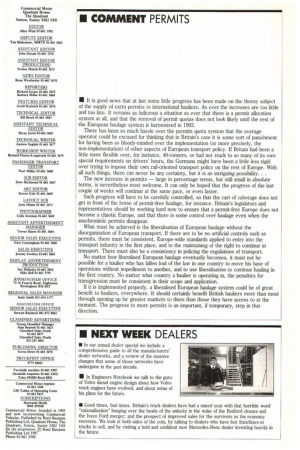• It is good news that at last some little
Page 5

If you've noticed an error in this article please click here to report it so we can fix it.
progress has been made on the thorny subject of the supply of extra permits to international hauliers. As ever the increases are too little and too late. It remains as ludicrous a situation as ever that there is a permit allocation system at all, and that the removal of permit quotas does not look likely until the rest of the European haulage system is harmonised in 1992.
There has been so much hassle over the permits quota system that the average operator could be excused for thinking that in Britain's case it is some sort of punishment for having been so bloody-minded over the implementation (or more precisely, the non-implementation) of other aspects of European transport policy. If Britain had been a little more flexible over, for instance, 40-tonners, or had not stuck to so many of its own special requirements on drivers' hours, the Germans might have been a little less rigid over trying to impose their own rail-oriented transport policy on the rest of Europe. With all such things, there can never be any certainty, but it is an intriguing possibility. . .
The new increase in permits — large in percentage terms, but still small in absolute terms, is nevertheless most welcome. It can only be hoped that the progress of the last couple of weeks will continue at the same pace, or even faster.
Such progress will have to be carefully controlled, so that the cart of cabotage does not get in front of the horse of permit-free haulage, for instance. Britain's legislators and representatives should be working hard now to ensure that a permit-free Europe does not become a chaotic Europe, and that there is some control over haulage even when the anachronistic permits disappear.
What must be achieved is the liberalisation of European haulage without the disorganisation of European transport. If there are to be no artificial controls such as permits, there must be consistent, Europe-wide standards applied to entry into the transport industry in the first place, and to the maintaining of the right to continue in transport. There must also be a consistency in policing the regulations of transport.
No matter how liberalised European haulage eventually becomes, it must not be possible for a haulier who has fallen foul of the law in one country to move his base of operations without impediment to another, and to use liberalisation to continue hauling in the first country. No matter what country a haulier is operating in, the penalties for transgression must be consistent in their scope and application.
If it is implemented properly, a liberalised European haulage system could be of great benefit to hauliers, everywhere. It should certainly benefit British hauliers more than most through opening up far greater markets to them than those they have access to at the moment. The progress to more permits is an important, if temporary, step in that direction.




















































































